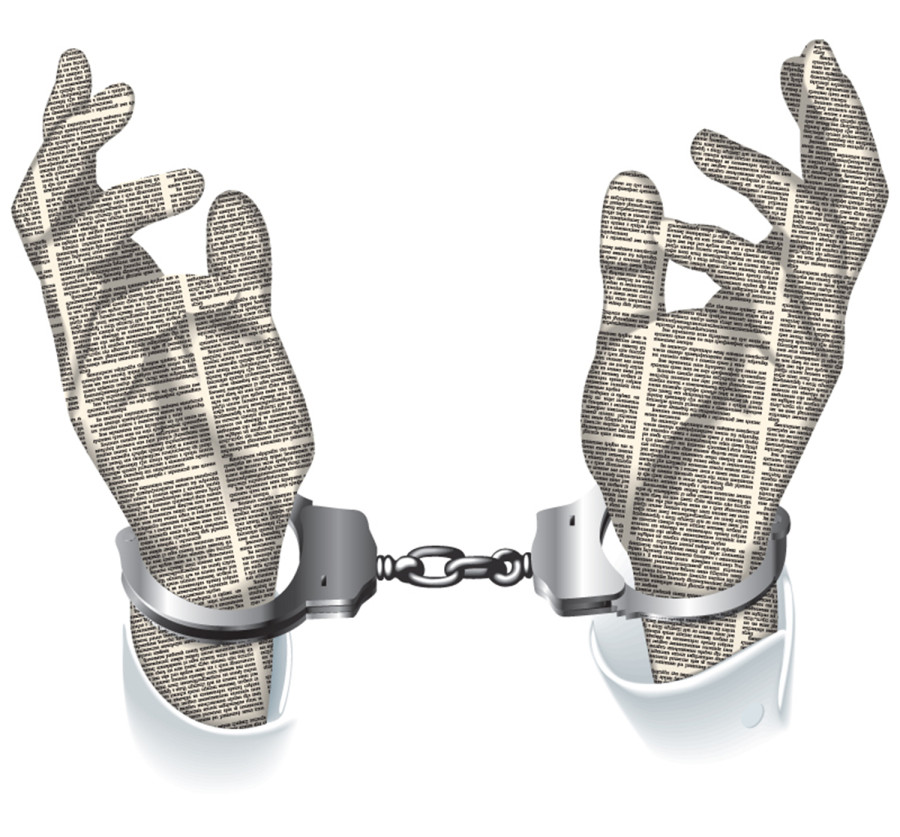Columns
Mockery of press freedom
The year 2019 saw more incidents related to press freedom violation than in the past seven years.
Bhanu Bhakta Acharya
At the end of last year, a photo of a so-called oath-taking ceremony, in which around 350 media persons were seen swearing allegiance to the ruling party and the government, went viral. This is perhaps the worst mockery of independent journalism in the country observed in 2019. Looking back at the past year from the perspective of press freedom and freedom of expression, the Nepal Communist Party-led government appears to have become more aggressive and hostile with its attempts to control the freedoms guaranteed by the constitution. Aiming to silence criticism against the government and the ruling party, it introduced several repressive laws.
The year 2019 saw more incidents related to press freedom violation than in the past seven years, according to a report of Freedom Forum Nepal. There were 111 incidents affecting 163 journalists, including 49 physical attacks, 38 arrests and 33 threats. According to the report, the highest number of incidents occurred in Province 3, with Kathmandu Valley bearing the brunt of the violations.
Harassed and intimidated
Journalists were harassed and intimidated by employing the Electronic Transaction Act. In April, Arjun Giri of Pokhara was detained for cyber crime charges after a local businessman reported a case of defamation. Giri had published a story on his portal about financial fraud involving the businessman. A similar case was filed against Shiva Gaunle, editor of the Centre of Investigative Journalists, after the publication of a Nepal Leaks report which looked into dozens of Nepali entrepreneurs who had invested in international tax havens by evading national regulations.
The government also warned singers, artists and activists that they were not free to express their critical opinions in any form. Singer Pashupati Sharma was forced to remove his song critical of the government from YouTube on February 16 after the youth wing of the ruling party issued a threat. Thakur Timalsina, a poet from Rasuwa, was arrested on April 26 for his alleged support of a banned political party. Comedian Pranesh Gautam was arrested on June 7 for his critical comments about a film and remained in custody for nine days. Anti-corruption activist Gyanendra Shahi was severely beaten up on September 28 by a pro-government vigilante group in Chitwan when he was organising a campaign.
The year witnessed the largest effort of government agencies to silence journalists, members of the public and other stakeholders by introducing and implementing authoritarian laws, regulations and policies. The Information Technology Bill, for example, aims to regulate internet-based companies in Nepal and tighten the use of social media. Chapter 14 of the bill states that individuals who post 'improper content' face a Rs1.5 million fine and a five-year jail term. The Individual Privacy Act threatens investigative journalists as it allows their report to be taken as evidence of violation of a citizen's right to privacy. The Advertisement Regulation Bill intends to criminalise advertisement content. The government also introduced a policy that restricted civil servants from sharing their views on social media platforms.
All levels of government, from federal to municipal, drafted laws that contradict constitutional provisions, specifically Articles 17, 19 and 27, and international standards of press freedom and freedom of expression. Provinces 1, 2, 5 and 6 introduced media and information related laws (such as Defamation Act and Right to Privacy Act) that were strategically developed to control journalists with regard to accessing information and disseminating critical reports. Several municipal governments introduced laws that were harsher than federal and provincial laws to suppress and kill negative news about local officials.
Repressive provisions
After a deluge of national and international criticism, the government was supposed to reform the draconian laws and policies; but it has been laying low, possibly waiting for a favourable moment to pass them as they are. The much-defamed Media Council Bill is stalled in Parliament, and its repressive provisions remain intact. According to the bill, media houses and journalists can be fined up to Rs1 million for violating the journalists' code of ethics or tarnishing the dignity of individuals. More seriously, Media Council Nepal could come under the direct control of the government. Despite the many pledges issued by government agencies and political leaders, the state of impunity for crimes against journalists who were killed, disappeared or severely injured remains unaddressed.
When the government is involved in giving systematic political orientation to journalists as pro-government media cadre to cultivate a media environment favourable to it, darker days can be expected ahead with further attempts to curtail press freedom and control the political environment.
***
What do you think?
Dear reader, we’d like to hear from you. We regularly publish letters to the editor on contemporary issues or direct responses to something the Post has recently published. Please send your letters to [email protected] with "Letter to the Editor" in the subject line. Please include your name, location, and a contact address so one of our editors can reach out to you.




 15.12°C Kathmandu
15.12°C Kathmandu















